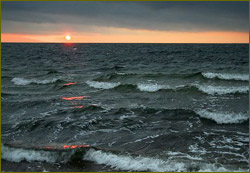08.30.2011 02:59

The Baltic Sea is a lot more abundant with living microorganisms than it was believed in the past. This sensational conclusion was made public at the 8th International Scientific Congress on the Baltic Sea held in St. Petersburg between the 22nd and the 28th of August. About 500 leading scientists and researchers and also university students and post-graduate students from 15 countries are taking part in the congress. Among the countries are Baltic states, Norway, Holland, the UK, France and the USA. The participants’ motto is “joint scientific research for steady management of environmental systems”. Our St. Petersburg correspondent Anatoly Novosyolov comments:
“This well-known international scientific forum unites experts form three informal scientific communities: the conferences of Baltic marine oceanographers, Baltic marine biologists and Baltic marine geologists. Since 1996 the International Scientific Congress on the Baltic Sea has been held once in two years in various European countries of the Baltic Region. This year it is taking place in St. Petersburg, Russia for the first time.”
In recent years the anthropogenic impact on the Baltic environmental system has been increasing faster than scientific knowledge necessary for the estimation and forecast of its environmental, social and economic consequences. In this connection, the previous forum decided to step up the research. Now, after a year of active joint work of scientists from Baltic countries, the congress in St. Petersburg heard a sensational report about a huge variety of microorganisms in the Baltic Sea. Since the 1930s it has been considered that due to its peculiarities, this sea has a low level of biological variety, says a well-known biologist, Professor Mikhail Shilin of St. Petersburg State Meteorology University:
“The Baltic Sea is a saltish water basin which is inconvenient for biological organisms. For this reason it was believed to have a limited number of biological species. Now the congress heard for the first time that there is a tremendous variety of living organisms at the microscopic level which we never saw in the past. In the same way, people who are surrounded by microorganisms in their everyday life do not notice them, while these microorganisms have a very strong impact on our health and behavior. Similarly, microorganisms affect all processes in the Baltic Sea, such as natural purification, water composition or reproduction of biological resources.”
What looks like theoretic research here has a great practical significance. Now people will be able to understand vital processes in the Baltic Sea and learn to manage and control them.
At the congress in St. Petersburg geologists are discussing the impact of the Earth’s crust movement on the lifting of the Baltic Sea bed in different parts. This is to be taken into consideration when building ports and other onshore structures. Oceanographers are sharing the results of their observations of hydrodynamic processes in the sea and the structure of its flows, which is important for calculating pollution transfer.
At the end of the congress its participants will give recommendations on the strategy and methods of resource management and environmental policy in this important region of Europe.
News source: Voice of Russia
 Print this news Print this news
City news archive for 30 August' 2011.
City news archive for August' 2011.
City news archive for 2011 year.
|